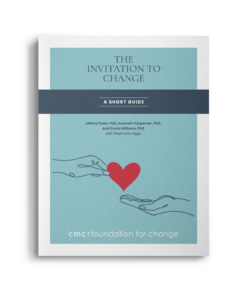When someone you love is using substances or engaging in a host of other risky behaviors, it’s natural to feel afraid, angry, betrayed, ashamed, and confused. It’s also normal to find yourself expressing these emotions by yelling, lecturing, shutting down, and maybe even throwing a few things.
The problem with this approach? It tends to take attention away from the problem at hand (‘you drank too much last night’) and put it back on you (‘you’re yelling and are always so negative’). Even worse, direct confrontation leads to increased resistance when it comes to asking a person to make a change. This we know from a number of studies on motivation.
Then why do so many of us still hold ideas like this: ‘if I don’t confront them and show them how upset they are making me, why would my loved one ever decide to change?‘
Welcome back to all that anger, fear, and confusion. When you have a loved one who is struggling with behaviors that are dangerous, like alcohol and drug use, it’s normal to do anything that feels like it might effect some change. Unfortunately, while it might feel that directly hitting your loved one with the harsh facts would jolt them into a desire to change (‘you look like a drunk’), there is a significant chance that you are likely driving your loved one further away both from your goal, and from you! And, most people actually feel worse after acting on their negative emotions because they escalate a variety of negative responses in others.
So then, how are you supposed to address the issue that feels like it is changing your loved one into someone you don’t know and harming your family? How do you handle that next morning, when you’re so angry and afraid, and just want to lash out? How do you help them (and you!) start to move to a place that feels safer and more manageable?
Managing Negative Emotions
Start by managing your negative emotions. The goal is not to banish or “solve” these feelings — that’s impossible — rather to manage them so you don’t act on them with your loved one. For most, the first step to managing negative emotions more effectively is to shift the focus onto your own self-care. Being well-rested, practicing relaxation techniques, blowing off steam through exercise, staying connected to outside friends and interests can all help you keep your balance. Engaging in good self-care can also keep your negative emotions from bursting out of you in the form of confrontational or hostile behaviors that push away your loved one and take you further from your ultimate goals.
Another helpful technique for managing your emotions is to be more aware of them. While it might feel backwards, being more aware of your negative feelings can help you manage them. For example, instead of walking around trying not to be mad until your reach the point your head is going to explode, if you know you are about ready to boil over into a confrontation, you can choose another path. You can walk away to cool off and take care of yourself so you can return later with the potential for a productive conversation. Additionally, if you learn positive communication skills you will improve the odds that you express your feelings in a way that your loved one can hear and may be interested in acting on.




